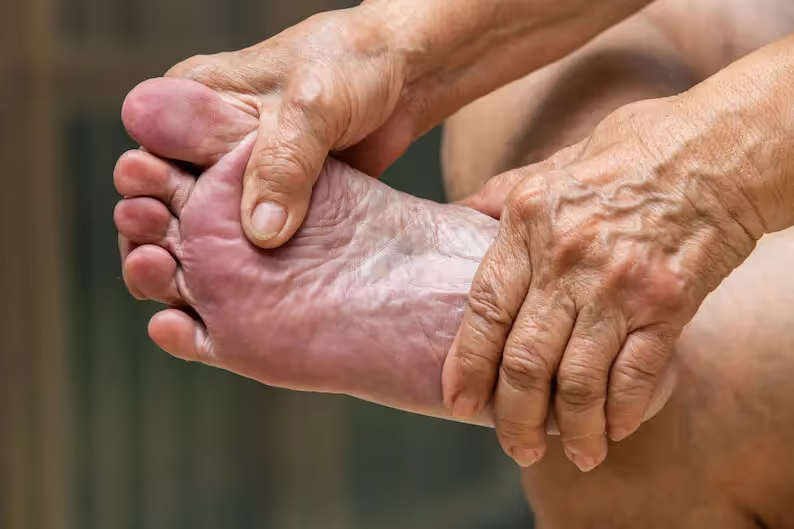Are Your Dogs a Barkin'? It's usually not until we stub our toe in the middle of the night or do something else to hinder our ability to walk that we pay much attention to our feet. However, we should. Foot health is vital to your overall ability to stay active and mobile as you get older. But not just for the simple reason that we need our feet to walk.
Have you ever wondered why your doctor always checks your feet when giving you an exam? It's because your foot health can tell you a great deal about your overall health. Taking a close look at your feet and toes could reveal signs of an underlying medical condition you didn't even know you had.
It's true! Unhealthy feet may indicate a serious health issue. Some chronic conditions often present symptoms that first show up in your feet. But don't start panicking just yet. It's important to be aware of any unusual symptoms so you can address them with your primary care provider. Here are six symptoms to keep an eye out for when looking at your feet.
Cold Feet and Toes
While cold feet could simply mean that you're just cold and need to bundle up, it could also indicate a vascular or circulatory problem. Cold feet could be a sign that you're experiencing restricted blood flow. This can result from a number of reasons, including having a blocked or constricted artery.
Poor circulation is also a common side effect of diabetes, smoking, and other familial contributary factors. In addition,high blood sugar levels can cause your arteries to become narrowed, thus reducing blood supply to your tissues.
If you notice that your feet and toes are perpetually cold to the touch, you should bring this issue to your provider's attention.
Swollen and Painful Big Toe or Foot
We all experience swollen feet from time to time, especially if we've been sitting for an extended period of time. But the sudden onset of swelling and pain in your big toe and foot could be a sign of something more serious, such as high blood pressure or gout.
High blood pressure, or hypertension, can cause damage to your blood vessels, including those in your feet. It occurs when there is a buildup of plaque in your blood vessels, which results in decreased circulation and a condition called peripheral vascular disease(PVD).
Gout is a form of inflammatory arthritis caused by elevated levels of uric acid. It usually affects one joint at a time, often being your big toe. It is extremely painful and characterized by swelling, redness, and tenderness.
Burning Pain
Temporary burning or swollen feet is not uncommon if you suffer from a skin infection, such as an athlete's foot. However, burning feet is most often a sign of nerve damage (peripheral neuropathy). Neuropathy is a result of damage to the nerves located outside of your brain and spinal cord. Your hands and feet are usually the first to display numbness and pain. The most common cause of peripheral neuropathy is diabetes, but it can also result from injuries, infections, and exposure to toxins. Many times this burning sensation can feel like a pins and needles sensation. If you're experiencing anything close to this, consult your provider immediately.
Discolored or Deformed Toenails
Have you glanced at your toes lately and noticed that your toenails look a little "funky?" If your toenails have changed colors, developed little holes (pits), white lines, or look sunken or spoon-shaped, this could be an indication of an underlying medical condition. More often than not, these are usually signs of nail fungus or repetitive trauma.
Older adults are more prone to foot health issues such as fungal nail infections because our nails dry out as we age. This can lead to cracks, making it easier for fungal infections to get inside the nail.
Foot Sore that Won't Heal
Although walking and wearing shoes might slow down the healing of a sore on your foot, sores should still typically heal in a pretty reasonable amount of time. However, if you have a sore or ulcer that just won't heal, that may be a sign that something more serious is going on. For example, poor circulation due to diabetes can prevent healing. Also, a sore that refuses to heal could also be a symptom of evolving skin cancer.
Weight-bearing Pain Not from Trauma
We've all had those moments where we look down and see a bruise on either our leg or arm and have no idea where it came from. Our feet can also experience "injury" without us even realizing it. If you're experiencing pain in your feet when applying weight or pressure, you might be suffering from a stress fracture.Stress fractures are tiny cracks in the bone that occur from overuse and when our muscles become fatigued and unable to absorb added shock.
Pay Attention to Your Feet for Better Health
Even though many of your symptoms pertaining to your feet are probably nothing and benign, it's important to discuss your foot health findings and concerns with your provider. Your feet could help to shine a light on a more serious condition you didn't even realize you had. Catching diseases early is vital to treating conditions effectively and successfully. So if your feet are talking, take the time to listen.




